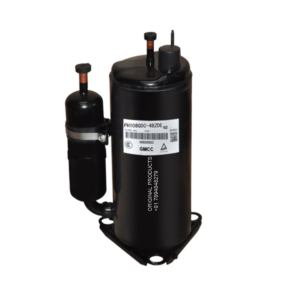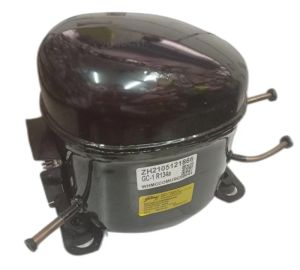What is the function of Refrigeration compressor ?
Compressors play a crucial role in refrigeration systems, acting as the “heart” that circulates refrigerant and facilitates the heat exchange process. There are several types of compressors used in refrigeration, each with its own advantages and applications. A compressor is a machine or tool used to reduce the volume of gas or air and increase pressure. Compressors are used in various applications, such as in industry, agriculture, and household appliances. The compressor generally consists of two main parts: the engine block and the pressure regulator component.
Air Conditioning Compressors (Refrigeration Compressor)

- Positive displacement, and.
- Dynamic.
Refrigerators Compressors (Refrigeration Compressors )

A Refrigeration Compressor draws refrigerant from the evaporator at a relatively low pressure, compresses it and then discharges it to the condenser where it is cooled. The refrigerant then moves to the expansion valve and the evaporator before being compressed again.
Types of refrigeration compressors
1. Reciprocating Compressors:
- Overview: Among the most widely used compressors, reciprocating compressors operate on the principle of piston-driven motion. This involves the back-and-forth movement of a piston within a cylinder, compressing the refrigerant gas.
- Applications: Reciprocating compressors find frequent deployment in household refrigerators and smaller commercial refrigeration systems. Their versatility makes them suitable for applications with varying load requirements.
- Advantages: Cost-effectiveness and simplicity in design make reciprocating compressors a preferred choice for domestic and light commercial applications.
2. Rotary Compressors:
- Overview: Rotary compressors, characterized by a rotating motion, are compact and efficient. They operate with a continuous flow of refrigerant achieved through a rotating mechanism.
- Applications: Commonly found in small to medium-sized air conditioning units and refrigeration systems, rotary compressors offer a balance between size and performance.
- Advantages: Known for their quiet operation and reduced maintenance requirements compared to reciprocating compressors, rotary compressors are favored in applications where space and noise considerations are paramount.
3. Scroll Compressors:
- Overview: Scroll compressors utilize a spiral motion to compress refrigerant. This design results in a smoother and quieter compression process.
- Applications: Ideal for air conditioning and commercial refrigeration, scroll compressors are valued for their high energy efficiency and reliability.
- Advantages: The efficiency and reliability of scroll compressors make them a popular choice for applications where consistent performance and reduced noise levels are crucial.
4. Screw Compressors:
- Overview: Well-suited for heavy-duty industrial applications, screw compressors employ intermeshing helical rotors to compress refrigerant.
- Applications: Large-scale industrial refrigeration systems and air conditioning units benefit from the high capacity and durability of screw compressors.
- Advantages: Known for their efficiency in continuous and demanding operations, screw compressors are prized for their reliability and ability to handle varying loads.
5. Centrifugal Compressors:
- Overview: Centrifugal compressors use a high-speed rotating impeller to accelerate and compress the refrigerant, making them suitable for large industrial systems.
- Applications: Widely deployed in industries requiring high-capacity refrigeration, such as petrochemical and manufacturing plants.
- Advantages: Centrifugal compressors excel in applications with fluctuating loads, offering high efficiency and capacity.
Key Considerations:
- Efficiency: Compressors significantly influence the overall energy efficiency of a refrigeration system. The choice of compressor type should align with the specific requirements of the application to optimize efficiency.
- Capacity: Different refrigeration compressors come with varying capacities. Selecting a compressor that matches the cooling load of the system ensures optimal performance and energy utilization.
- Reliability: The durability and maintenance requirements of a compressor directly impact the overall reliability of a refrigeration system. Regular maintenance is crucial to prevent breakdowns and extend the lifespan of the compressor.

